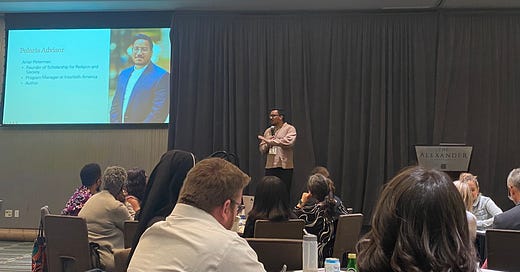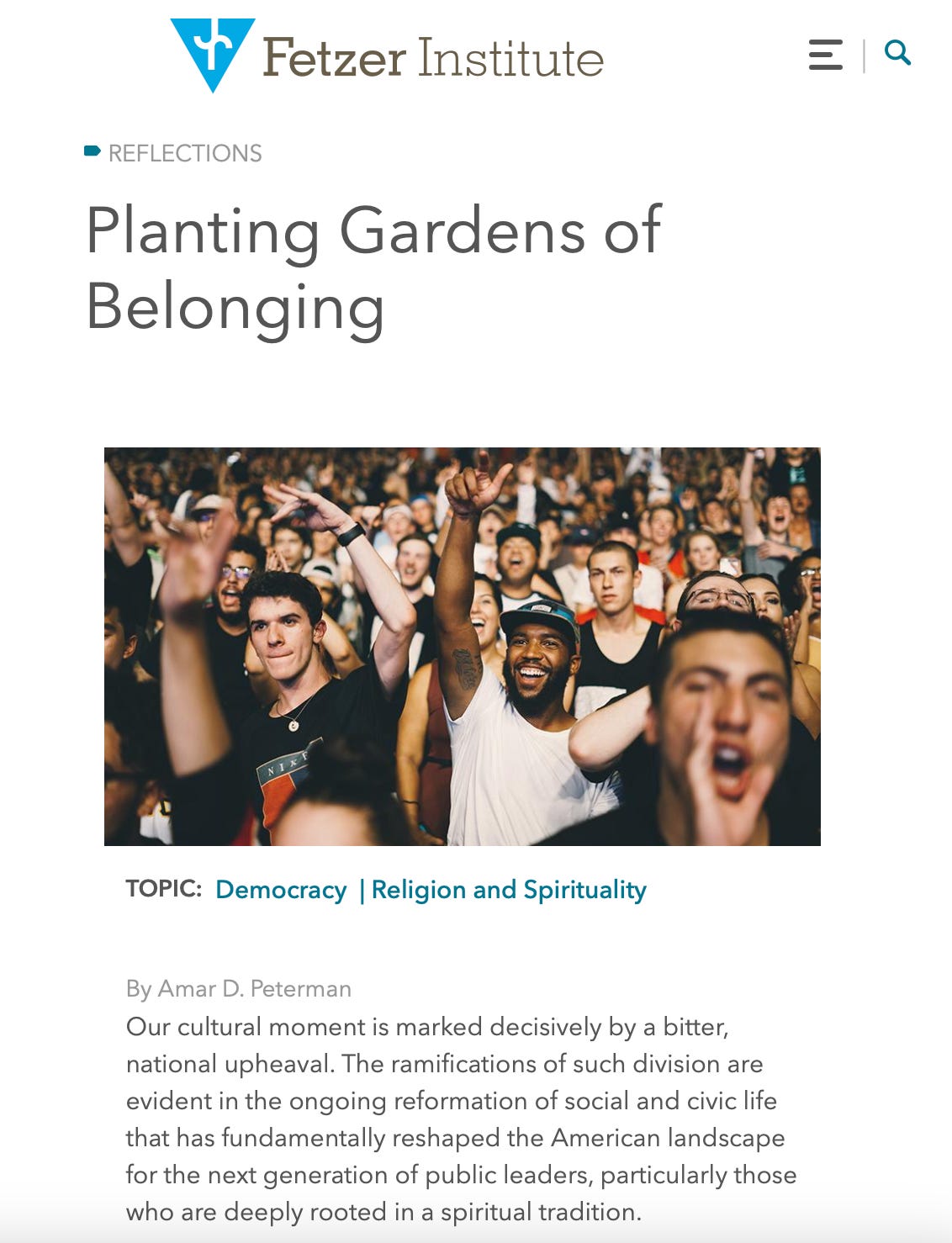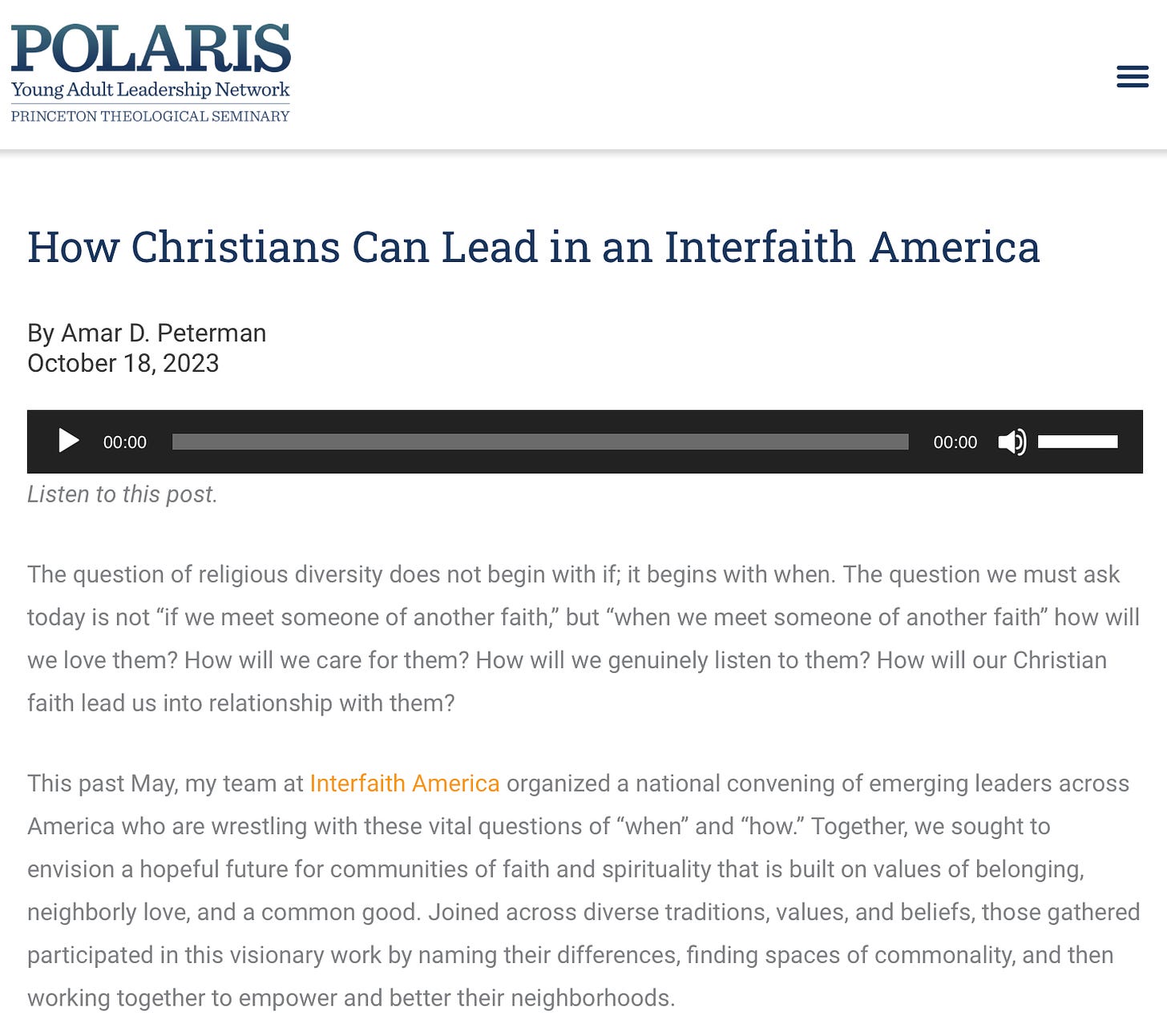why do I keep writing about young adults?
three new articles on the hope I find in the next generation of leaders
Over the past few months, I’ve had several opportunities to write about the hope I find in the constructive and thoughtful work accomplished by young people of faith.
If there was any question, I am no expert on young adults. However, I find the topic easy to write about because, really, I am talking about my friends and peers.
Over the past two years, I’ve organized a community of emerging Christian leaders that has grown into a national network. A large part of my portfolio at Interfaith America is managing their emerging leaders network. Last year I joined Augsburg University’s Riverside Innovation Hub as a young adult author, and this year I began serving as an advisor for Princeton Seminary’s Polaris Young Adult Network. Earlier this month, I also had the opportunity to join the Lilly Endowment and Center for Congregations in Indianapolis at their latest Young Adult Initiative gathering alongside folks from Augsburg and Princeton, as well as Fuller, Austin Seminary, Yale, and more.
Through all of these opportunities, I’ve met and worked alongside hundreds of young adults who are critically and generatively moving their communities toward love, justice, and peace. They are the reason I can write and speak confidently about the hope I have for the future of the church and our nation.
Earlier this month, The Fetzer Institute asked me to write about my experience as a young adult engaged at the intersection of religious and public life:
My engagement at the intersection of faith and public life over the past decade has taught me an important lesson: change is not only possible, it is inevitable. Indeed, our country and those who reside in it are constantly shifting and changing. We are ever caught in liminal space: of devastation and building, of death and life, of grief and joy, of pessimism and hope, of death and new life, of what is and what might be. The collective spirit of America is a malleable energy that is impossible to contain.
Framed another way, this decade has—for myself and many others—removed the illusion of permanence. Despite their present grandeur or platform, no person, institution, building, or system will stand forever. The clarity and freedom that accompany this realization are the beating heart of great social movements that have prophetically envisioned new designs of habitation and built new possibilities for our shared life marked by belonging, community, and inclusion. These movements of change directed by and towards love resist the bifurcation of buildings from bodies and systems from citizens. Most importantly, these movements of change are not destructive in their end; their vision is one of redemption and justice
Reflecting on my opportunities to lead as a Christian in interfaith spaces, I published my first piece for the Polaris Network last week:
” The task of the Christian leader in interfaith spaces is not silent action, but rather stewardship of one’s words and ears—the Christian leader can listen actively with compassion and humility, more eager to learn about other faiths than prescribe their own. This is why I believe our Christian witness is not found in declaring propositional truths about Christianity. Rather, we bear witness to the power of God and the Lordship of Christ by deeply loving our neighbors. Said another way, Christian leadership in interfaith spaces involves releasing ourselves into the wonderful truth that Jesus is Lord and recognizing that we can learn from everyone—even those who are not believers—about Jesus by the way that Jesus shapes everything into his own glory.
Christian witness in interfaith spaces is less about knowledge (“let me tell you the Gospel”) and more about the way we value and devote ourselves to Jesus as the highest good and governing force of our lives. When Christianity becomes a way of life, leadership in an interfaith context means entering into genuine conversation where beliefs are shared, values are expressed, and mutual understanding is fostered. This, I believe, is the example that Jesus offers us. In the Scriptures, Jesus does not spend his earthly ministry pleading and endlessly attempting to convince those around him that he was the Son of God. Instead, Jesus lives and ministers out of the reality that he is exactly who he proclaimed to be. This confident witness is incredibly powerful. In the Scriptures, Jesus’ ministry compelled others to leave behind that which they clung to—material and spiritual—and follow him. This is our model for Christian leadership.
As I wrapped up the first draft of my co-authored chapter contribution, The Riverside Innovation Hub asked if I’d share why I said ‘yes’ to this project—a book written by young leaders for the church:
Writing is always shaped by the people around us and the places we are located in. The best writing embraces this, capturing every moment as an opportunity to tell a story or find meaning in the ordinary moments of our lives. Writing that reflects these daily experiences and infuses such with sacred meaning holds the opportunity to change us—even convict us—as we are called into a community beyond ourselves.
I said yes to this experience because of this truth. Through this project, I am not only brought into conversation with other writers across the country, but into active participation towards a shared goal. As we gather to envision a hopeful future for the Christian church, we are diligently writing and marking out tangible steps to create equitable spaces of inclusion and belonging for young people in local congregations across the United States. Together, we represent a diversity of experiences, locations, denominations, and beliefs within Christianity. These differences, though, are not a hindrance to our cooperation; they are gifts that allow this project to speak to more people than any individual could do on their own.









I love the clarion call to live confidently from faith in Jesus and not anxiously for faith in Jesus. Yes.